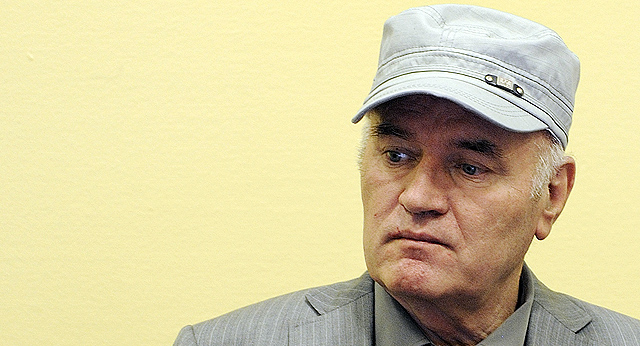Ratko Mladic not stand the pain and decided he did not want to live. In 2006, the man accused of genocide by the International Criminal Tribunal for the Former Yugoslavia had been a fugitive 11 years. He suffered from kidney stones that caused a sharp pain, which led him to order one of his aides to end their suffering by killing him.
"We could not take a doctor to treat him," said the former aide, who declined to give his name because he still faces legal proceedings. "We gave him some painkillers, but it was so much pain that he begged us to kill," he said. The refusal of the supporters of Mladic to end his life was one of many episodes secrets fled his years and ended with his arrest last week.
Interviews with former assistant, a Serbian agent who participated in his arrest, with a senior government official who oversaw the operation and others, as well as information included in U.S. diplomatic cables, show a man whose power and influence were decreasing year. Mladic was found last week alone, on a farm, surrounded by disorder and drugs.
At first he lived quietly at his home in the Serbian capital Belgrade. As commander who oversaw the siege of Sarajevo and other operations, Mladic has earned a reputation for daring, someone who did not seek shelter when other people ran for safety. It helped to be popular. He was hated by the slaughter of Bosnian Muslims at Srebrenica in 1995, when 8,000 men and boys were killed and the long siege of Sarajevo, but the respect he instilled among Serbs relieved his early years as a fugitive.
Bosnian Serbs failed to create an independent state, but succeeded in establishing a republic in half of Bosnia under a weak central government. Many applaud Mladic for it and respect his reputation as someone tough but fair, incorruptible in a war in which many leaders and entrepreneurs got rich.
Key official protected Mladic for years after being accused in 1995. A 2006 U.S. diplomatic cable, released by WikiLeaks, offers an example of how much support was the former commander ever. Svetko Kovac, director of the military security agency, told the war crimes prosecutor for the UN to "about 300-400" people were part of a support network for Mladic between 1997 and 2004.
Despite having been convicted, Mladic continued his work as Bosnian Serb military commander in 1996 and then moved to Belgrade where he lived with his family until 2002, according Aleksandar Mihailovic, a friend who lived in the neighborhood of the capital Banov Brdo Serbia . "Everyone came to pay their respects," said Mihailovic, a real estate agent.
"Always asking advice and favors. He became an idol for people, the only person who believed in 1994-1995 ", he added. According Mihailovic, among those who visited him during those years was Vojislav Kostunica, leader of the successor to the wartime Slobodan Milosevic as Yugoslav president in 2000.
The period of stability began to see an end in 2001 when pro-Western Prime Minister Zoran Djindjic came to power. One day he said Mihailovic, Mladic simply disappeared from his home. Although the general was still popular, the young reformist leader sought to distance Serbia from his years of war and international pariah.
In 2001, Belgrade sent Milosevic to The Hague where the former politician died before his trial ended. in 2002 approved a law allowing extradition of suspected war crimes and urged the Government to surrender all the accused. After that, Mladic moved at regular intervals from one place to another, mostly in New Belgrade district buildings, as people who helped him and then faced justice for harboring a fugitive.
"We were moving from one apartment to another every two or three weeks ago," said one person who declined to be identified because he still faces legal proceedings. "I sometimes played chess with him, brought him food, newspapers, talk much," he added. Chess was one of the pastimes of Mladic during the war.
Often played while traveling in military barracks or even on the front. The suicide of his daughter Ana in 1994 also seems to be obsessed Mladic. Before his extradition to The Hague on Tuesday, the Serbian authorities allowed a final visit to his grave in Belgrade. "We often talk much about his daughter, about her suspicions that he had killed a secret service," said the former aide who described the problems of renal colic.
"He was asking about his family, how they lived, about his son and his wife. Almost never talked about the war," he added. Staying most of the time in hiding with a limited number of contacts was causing mood swings. "Sometimes in a good mood, sometimes he was depressed. In these bad times asked us to kill them if anyone tried to arrest him.
I always had a loaded gun with him. At some point also had a hand grenade, but asked us we got rid of it because it was unsafe to carry such weapons, "said the assistant. "Sometimes I go out walking, usually in the evenings. Sometimes I would go with him. Looked like a couple of retired, that were done," he added.
Mladic was suffering from various medical problems. But getting drugs was not a problem for your contacts. Serbian pharmacies rarely ask for recipes. A researcher who worked on the search for Mladic said that one of the major topics that were focused in recent years was in doctors or pharmacists who may have been helping him.
Since 2006, Serb officers conducted several raids on homes and businesses around the country hoping to learn more about how it was financed their support network. 


"We could not take a doctor to treat him," said the former aide, who declined to give his name because he still faces legal proceedings. "We gave him some painkillers, but it was so much pain that he begged us to kill," he said. The refusal of the supporters of Mladic to end his life was one of many episodes secrets fled his years and ended with his arrest last week.
Interviews with former assistant, a Serbian agent who participated in his arrest, with a senior government official who oversaw the operation and others, as well as information included in U.S. diplomatic cables, show a man whose power and influence were decreasing year. Mladic was found last week alone, on a farm, surrounded by disorder and drugs.
At first he lived quietly at his home in the Serbian capital Belgrade. As commander who oversaw the siege of Sarajevo and other operations, Mladic has earned a reputation for daring, someone who did not seek shelter when other people ran for safety. It helped to be popular. He was hated by the slaughter of Bosnian Muslims at Srebrenica in 1995, when 8,000 men and boys were killed and the long siege of Sarajevo, but the respect he instilled among Serbs relieved his early years as a fugitive.
Bosnian Serbs failed to create an independent state, but succeeded in establishing a republic in half of Bosnia under a weak central government. Many applaud Mladic for it and respect his reputation as someone tough but fair, incorruptible in a war in which many leaders and entrepreneurs got rich.
Key official protected Mladic for years after being accused in 1995. A 2006 U.S. diplomatic cable, released by WikiLeaks, offers an example of how much support was the former commander ever. Svetko Kovac, director of the military security agency, told the war crimes prosecutor for the UN to "about 300-400" people were part of a support network for Mladic between 1997 and 2004.
Despite having been convicted, Mladic continued his work as Bosnian Serb military commander in 1996 and then moved to Belgrade where he lived with his family until 2002, according Aleksandar Mihailovic, a friend who lived in the neighborhood of the capital Banov Brdo Serbia . "Everyone came to pay their respects," said Mihailovic, a real estate agent.
"Always asking advice and favors. He became an idol for people, the only person who believed in 1994-1995 ", he added. According Mihailovic, among those who visited him during those years was Vojislav Kostunica, leader of the successor to the wartime Slobodan Milosevic as Yugoslav president in 2000.
The period of stability began to see an end in 2001 when pro-Western Prime Minister Zoran Djindjic came to power. One day he said Mihailovic, Mladic simply disappeared from his home. Although the general was still popular, the young reformist leader sought to distance Serbia from his years of war and international pariah.
In 2001, Belgrade sent Milosevic to The Hague where the former politician died before his trial ended. in 2002 approved a law allowing extradition of suspected war crimes and urged the Government to surrender all the accused. After that, Mladic moved at regular intervals from one place to another, mostly in New Belgrade district buildings, as people who helped him and then faced justice for harboring a fugitive.
"We were moving from one apartment to another every two or three weeks ago," said one person who declined to be identified because he still faces legal proceedings. "I sometimes played chess with him, brought him food, newspapers, talk much," he added. Chess was one of the pastimes of Mladic during the war.
Often played while traveling in military barracks or even on the front. The suicide of his daughter Ana in 1994 also seems to be obsessed Mladic. Before his extradition to The Hague on Tuesday, the Serbian authorities allowed a final visit to his grave in Belgrade. "We often talk much about his daughter, about her suspicions that he had killed a secret service," said the former aide who described the problems of renal colic.
"He was asking about his family, how they lived, about his son and his wife. Almost never talked about the war," he added. Staying most of the time in hiding with a limited number of contacts was causing mood swings. "Sometimes in a good mood, sometimes he was depressed. In these bad times asked us to kill them if anyone tried to arrest him.
I always had a loaded gun with him. At some point also had a hand grenade, but asked us we got rid of it because it was unsafe to carry such weapons, "said the assistant. "Sometimes I go out walking, usually in the evenings. Sometimes I would go with him. Looked like a couple of retired, that were done," he added.
Mladic was suffering from various medical problems. But getting drugs was not a problem for your contacts. Serbian pharmacies rarely ask for recipes. A researcher who worked on the search for Mladic said that one of the major topics that were focused in recent years was in doctors or pharmacists who may have been helping him.
Since 2006, Serb officers conducted several raids on homes and businesses around the country hoping to learn more about how it was financed their support network.



- Ratko Mladic trial: Srebrenica the strongest motive for war crimes trial (01/06/2011)
- Boy in 1995 video with Mladic recalls encounter (01/06/2011)
- Bosnian Muslim boy in Mladic video looks back (01/06/2011)
- Mladic's trial is no recipe for reconciliation in Serbia - activist (01/06/2011)
- "Whatever was done in Srebrenica, he has nothing to do with it. His orders were to evacuate the..." (29/05/2011)
No comments:
Post a Comment